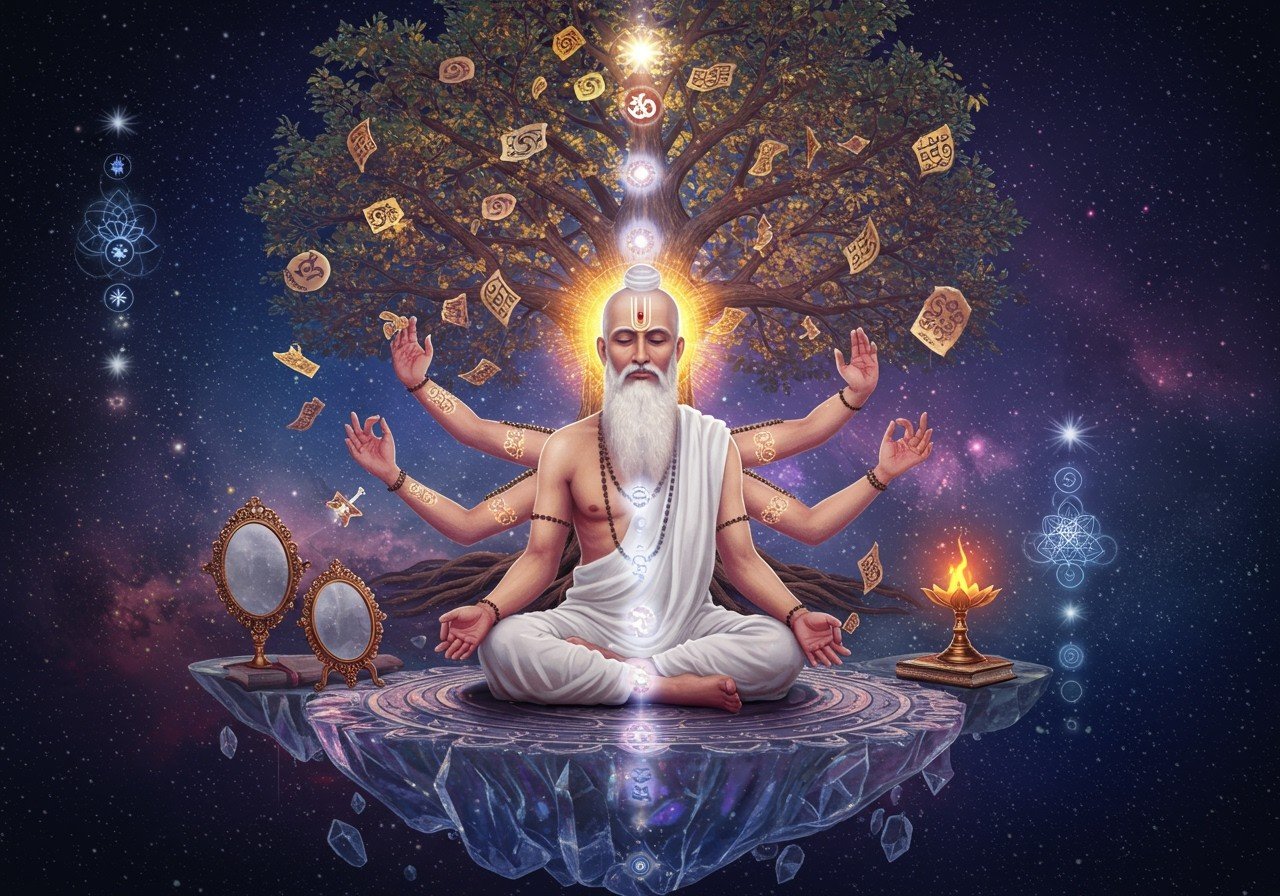
Jnana Yoga, also known as Gyana Yoga, is a profound journey toward understanding the true nature of the Self (Atman) and its unity with ultimate reality (Brahman). Known as the “yoga of knowledge,” it offers a path of self-realization through self-study, contemplation, and meditation. Unlike other yoga forms that focus on physical fitness, Jnana Yoga emphasizes inner wisdom and profound inner understanding.
Core Practices of Jnana Yoga
Begin your Jnana Yoga journey with Shravanam, the practice of hearing or studying. This involves opening your mind to the teachings of spiritual texts like the Ramcharitmanas and the Bhagavad Gita. Immersing yourself in these scriptures and reflecting upon their meaning helps absorb valuable insights. Seek guidance from a respected teacher or Guru for a deeper understanding of Vedanta, particularly if you’re new to these concepts. You can find a wide selection of spiritual texts and other helpful resources on Poojn.in.
Next, engage in Mananam, or reflection. Contemplate the lessons you’ve learned. Ask yourself why you think or act in certain ways. This self-reflection brings clarity, fosters personal growth, and deepens your understanding of the teachings.
Nididhyasana, or meditation, is the third core practice. Deep, continuous meditation on the truths you’ve learned helps internalize these insights and achieve realization. Explore our collection of meditation supplies, including cushions, beads, and incense, on Poojn.in to enhance your practice.
Self-Inquiry and the Four Pillars of Knowledge
Atma Vichara, or self-inquiry, involves asking profound questions like “Who am I?” and “What is the nature of existence?”. This practice encourages you to explore the source of consciousness that perceives thoughts and emotions, going beyond the surface level of your being. This introspection can be aided by the serene atmosphere created with items like incense and dhoop, available at Poojn.in.
Adi Shankaracharya outlined four pillars essential for Jnana Yoga:
- Viveka (Discrimination): Learn to discern between the real and the unreal. Recognize the ever-changing nature of the world while understanding the unchanging divine within. Observe how external circumstances shift constantly, while the core of your being remains steady. This discerning wisdom is key to navigating the complexities of life.
- Vairagya (Renunciation): Practice detachment from material possessions and outcomes. Accept the impermanence of the external world and reduce attachment to worldly pleasures and pains. This doesn’t necessitate abandoning worldly responsibilities, but rather cultivating a healthy detachment from them.
- Shatsampatti (The Six Wealths): Cultivate essential qualities for spiritual growth, including tranquility (Shama), self-control, and mental peace. These inner riches pave the way for deeper self-understanding and a more fulfilling life.
- Mumukshutva (Longing for Liberation): Develop an intense yearning for liberation from the cycle of birth and death. This aspiration fuels the dedication needed for the challenging path of self-realization. You can find resources to support your spiritual journey, such as sacred texts and meditation supplies, on Poojn.in.
Integrating Jnana Yoga into Daily Life
Practice mindful awareness by observing your thoughts and actions without judgment. Cultivate non-attachment by focusing on the process rather than fixating on specific outcomes. Set aside time for reflective meditation, creating space for quiet introspection. Enhance your meditation practice with comfortable cushions and calming incense from Poojn.in.
Additional Techniques and Considerations
Explore the Neti Neti method, a contemplation technique involving negating everything that is not the Self (“not this, not this”). Delve into philosophical texts to deepen your understanding. Find a comfortable posture for meditation, whether seated, on the ground, or lying down. Consider using a meditation cushion from Poojn.in for enhanced comfort during your practice.
Traditionally, Jnana Yoga is practiced under the guidance of a Guru who offers personalized instruction and support. Self-reflection with honesty is crucial, acknowledging both your strengths and areas needing growth. Establish a formal meditation practice by dedicating time each morning and evening. Remember, progress in Jnana Yoga requires patience and curiosity as you journey towards self-awareness.
Poojn.in offers a wide variety of puja items like Laddoo Gopal statues and Shiva Lingams that can create a sacred space for contemplation and reflection, complementing your Jnana Yoga practice.
For those seeking a deeper immersion in their practice, explore the range of incense and mala beads available on Poojn.in, designed to enhance focus and create a tranquil environment.


